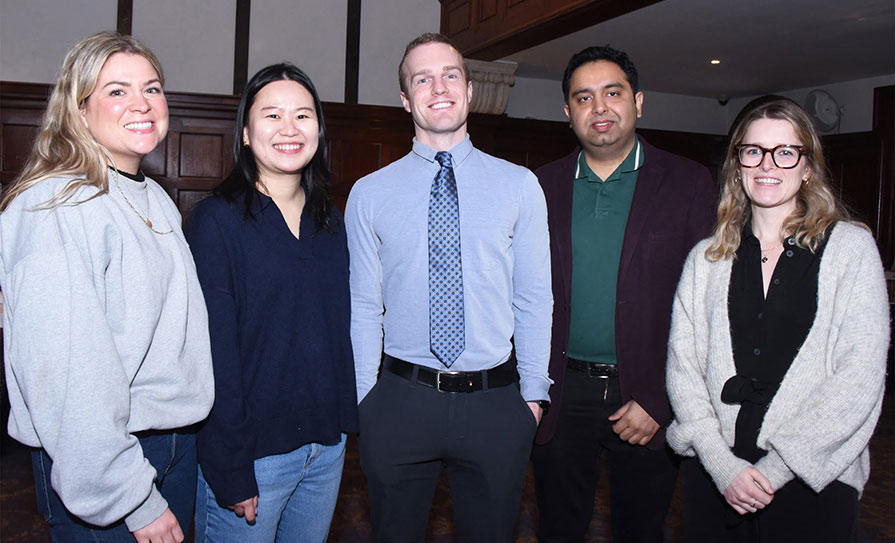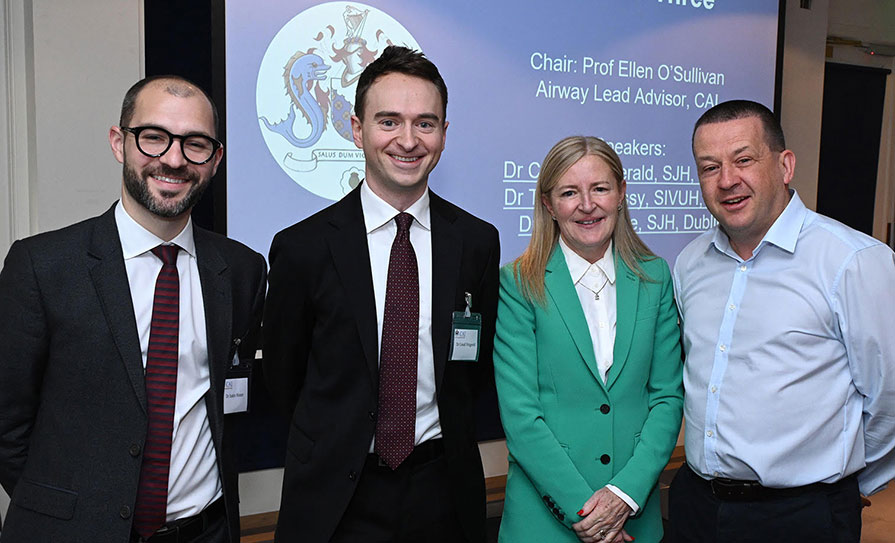The upcoming Winter Conference of the College of Psychiatrists of Ireland (CPI) will include talks on topics that are important for professional development, such as somatisation and psychosis, as well as issues that appear regularly in the media and have a wider social appeal.
The conference would not have happened if College members were not prepared to volunteer their expertise and free time to make it happen and that is important to note, Dr William Flannery, CPI Vice President and Conference Academic Organiser, told the <strong><em>Medical Independent</em></strong> (<strong><em>MI</em></strong>). “Much of the planning, organisation and inspiration of the conference has been achieved by members in their own time.”
In terms of the overall theme of the conference, Dr Flannery said that as well as psychosis and somatisation, professional networking is important. “Our college is still very young, so we are putting the networking onto a more formal basis,” he explained.
“On the psychosis element, we have a good range of speakers from across the island and from abroad. The aim is to discuss their research, for a learning experience but also for information sharing and looking into the future at how people can work together in a collaborative fashion.
“Then we have the interaction between psychiatry and physical health in the area of somatisation,” continued Dr Flannery. “Then there is something for everybody, in that we have a lot of very high-profile speakers in areas that have a connection with psychiatry — that is the social aspect. That is Jeremy Coid about cults, gangs and radicalisation and Tom Clonan on whistle-blowing and whistle-blowers. There are obviously psychiatric mental health aspects to that.”
The first day of the meeting, Thursday 16, begins with two talks on somatisation. The first by Dr Siobhan McHale, Beaumont Hospital, Dublin, is titled ‘Somatic Symptom Disorder — Explaining the (Medically) Unexplained’. Dr McHale will propose that learning to speak a psychosomatic language allows psychiatrists to communicate most effectively with patients and optimise clinical outcomes.
The second talk by Prof Maria Garralda Hualde, Professor Emeritus at Imperial College London, is on the topic of ‘Somatisation in Children and Adolescents’. This presentation will discuss why physical symptoms without an underlying medical disorder are common in children and young people and why they matter. Prof Hualde will discuss the psychiatric manifestation of such symptoms, the application of a biopsychosocial approach and helpful interventions.
An array of NCHD researchers will present research after the opening talks, with the winner of the Best NCHD Research Oral Presentation announced the following day, Friday 16. Those presenting will include Dr John Lally, St Vincent’s University Hospital, Dublin, on the topic of treatment-resistant schizophrenia; Dr Niamh Corcoran, University College Dublin, speaking on inflammatory markers in depression; and Dr Sarah Sexton will present on emergency references to the Paediatric Liaison Psychiatry Department in the Children’s University Hospital.
<h3 class=”subheadMIstyles”>Parallel sessions</h3>
Six parallel sessions are available for delegates to choose from after lunch on day one.
Dr Gearoid Fitzgerald, Leeds Partnership NHS Foundation Trust, UK, will present on ‘The Relevance of Balint Groups for Doctors in their Day-to-Day Clinical Work’.
Dr Ciaran Mulholland, Queen’s University Belfast, will talk on ‘Psychosis and Political Violence: Lessons from the Conflict in Northern Ireland’ and Prof Gary Donohoe, NUI Galway, will speak on the topic of ‘Difficulties with Social Cognition in Psychosis: Causes, Consequences and Treatments’.
Dr Piers Benn, Heythrop College, London, and a nephew of the British Labour Party politician Tony Benn, will speak on the ‘Moral Dimensions of Addiction’. Dr Benn will explore the concept of addiction and highlight the ways in which it both does, and does not, resemble a disease. He will suggest that concepts of control and choice are sometimes too readily abandoned, and will cast a sceptical eye on the claims made for many treatment programmes.
Another session focuses on the role of the psychiatrist today. Dr Miriam Kennedy, Highfield Healthcare, Dublin, will present a talk titled ‘What is a Psychiatrist? Competing Concepts, Competing Perspectives? Identity? What do we think?’
Dr Kennedy’s talk is the first of a planned series of workshops that aim to reach a consensus to lead a debate on what the College’s function is in communicating the role of a consultant psychiatrist. Dr Aidan Moran will also speak at this workshop on the topic of ‘Responsibility without Power: Unrealistic Expectations, Erosion of Professionalism’. Dr Moran will ask, ‘Can the role of the Consultant General Adult Psychiatrist be more Clearly Defined?’
The establishment of an Irish Psychosis Working Group is the subject of a session with a talk by Prof David Cotter, Beaumont Hospital, Dublin, and contributions from Dr Katherine Brown, Prof Aiden Corvin, Dr Eric Kelleher, Dr John Lyne, Prof Colm McDonald, Prof Veronica O’Keane and Dr Eric Roche. This session is designed to facilitate the interaction of researchers across Ireland who are interested in psychosis. The idea is to give these investigators four minutes each to summarise their work and plans and how they see a potential psychosis research group working together to obtain funding within the island of Ireland.
The final session features a presentation by Dr Lorcan Martin, Director of Professional Competence at St Loman’s Hospital, Mullingar, on the topic of ‘Professional Competence Now and the Shape of Things to Come’. This workshop will bring participants up to date with recent changes to professional competence schemes and will look at what is coming down the track in this area.
Day one concludes with a CSCST graduation and an examination award ceremony, which is followed by a drinks and canapé reception and conference dinner.
The second day begins with a session on recent advances in tackling the causes of mental illness. Prof Mary Cannon, RCSI, will give a talk titled ‘The Early Origins of Adult Mental Illness’ in which she argues that there is compelling evidence that most mental disorders already have roots in childhood mental health problems. The findings from large epidemiological studies, Prof Cannon will state, highlight the need to develop new models of care focused on prevention and early intervention.
<h3 class=”subheadMIstyles”>Childhood bullying</h3>
Prof Louise Arseneault, King’s College London, will talk about ‘The Pervasive and Persistent Impact of Childhood Bullying Victimisation’, summarising evidence that demonstrates the harmful impact of childhood bullying victimisation into adult years. Prof Ole A Andreassen, University of Oslo, will give a talk titled ‘Genetics and Imaging in Psychiatry: Update from the Enigma Study’, which will detail how small, subtle brain morphology variants appear to define severe mental disorders and how these are associated with common gene variants.
After the coffee break, there will be a talk that is highly relevant to Ireland and the world overall, with the title ‘Preventing Cults, Gangs and Radicalisation: Should Psychiatrists be Involved?’, which will be delivered by Prof Jeremy Coid, Emeritus Professor, Wolfson Institute of Preventive Medicine, Queen Mary University, London. The presentation will examine the common features of all of these phenomena, the epidemiology of extremism and the implications for future prevention.
<h3 class=”subheadMIstyles”>‘Corporate psychopaths’</h3>
After lunch on Friday, there will be two talks that will generate much interest. The first is ‘A Climate of Fear: Corporate Psychopaths at Work’ by Prof Clive Boddy, Middlesex University, London, who will discuss the influence that charming but psychopathic managers have in the workplace and how their bullying, abuse and unethical behaviour impacts employees, organisations and society.
Dr Tom Clonan, meanwhile, will present a talk titled ‘Whistle-blowing and Whistle-Blower Reprisal’ in which he outlines the personal consequences of becoming a whistle-blower in the armed forces. Dr Clonan will describe the professional, intellectual, legal and ethical implications for him as a Captain in the Defence Forces.
“I hope the programme will help us work towards a greater understanding of where we are as a profession, and in turn enhance the College’s ability to advocate on our behalf and our patients,” said Dr Flannery. “As at all conferences, there is informal networking. Hopefully this will develop into a formal network with the ability to use the conference and College structures to achieve what psychiatry in Ireland needs to be excellent.
“In the future, I would like to continue a number of themes, particularly through the parallel sessions,” Dr Flannery continued. “Professional competence has for a while now been a permanent slot. I’m hoping that ethics, law and a session on how to support our mental health will also be regular topics on the programme. The poster exhibition is another fixed slot, which I think works well as an opportunity to showcase and explore psychiatry beyond service provision.”
Dr Flannery made an appeal to delegates not to forget the social side of the conference. “There is our very popular conference dinner and I’m sure a hearty performance from the College Choir on Thursday evening. I’d like to invite everyone to also attend the CSCST Graduation and Examination Ceremony to welcome the future members of our growing college.”










Leave a Reply
You must be logged in to post a comment.